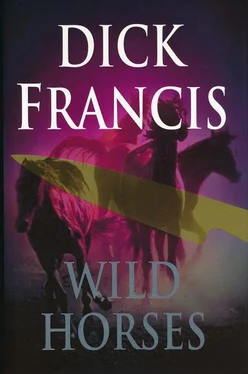Returning to Bedford Lodge, Nash and I ate room-service dinner together.
‘Go on,’ he said, ‘about the need for fantasy.’
‘Oh... I... ’ I hesitated, and stopped, unwilling to sound a fool.
‘Go on,’ he urged. ‘People say... in fact I say... that playacting isn’t a suitable occupation for a serious man. So tell me why it is.’
‘You don’t need me to tell you.’
‘Tell me why you make fantasies, then.’
‘Have some wine.’
‘Don’t duck the issue, dammit.’
‘Well,’ I said, pouring lavishly, ‘I wanted to be a jockey but I grew too big. Anyway, one day I went to see a doctor about some damage I’d done to my shoulder in a racing fall, and she asked me what I wanted to do with my life. I said “be a jockey” and she lectured me crossly on wasting my time on earth frivolously. I asked her what occupation she would recommend and she sternly told me that the only profession truly helpful and worthwhile was medicine.’
‘Rubbish!’
‘She scorned me for wanting to be merely an entertainer.’
Nash shook his head.
‘So,’ I said, ‘I rationalised it, I suppose. I’m still an entertainer arid always will be, I guess, and I’ve persuaded myself that I do at least as much good as tranquillisers. Everyone can go where their mind takes them. You can live in imaginary places without feeling the real terror or the real pain. I make the images. I open the door. I can inflame... and I can heal... and comfort... and get people to understand... and, for God’s sake, don’t remember a word of this. I’ve just made it up to entertain you.’
He drank his wine thoughtfully.
‘And in this movie that we’re engaged in,’ I said, ‘the dream lovers make the spurned wife’s existence happier. They’re the best way she can face her husband’s affair with her own sister. They’re her refuge... and her revenge.’
He smiled twistedly. ‘My character’s a shit, isn’t he?’
‘Human,’ I said.
‘And are you going to sell Howard on her suicide?’
I shook my head. ‘I’m sure she didn’t kill herself. But don’t worry, your character will avenge her death and come up smelling of roses.’
‘Has Howard written those extra scenes?’
‘Not yet.’
‘You’re a rogue, Thomas, you know that?’
We finished dinner peaceably, and together with Moncrieff mapped out the next day’s scenes, which were due to take place in the Athenaeum’s look-alike dining-room, happily by now built and ready.
After that meeting I un-Velcroed my restricting knife-repeller with relief and washed without soaking the dressing, and in sleeping shorts thought I’d just take a quick look at the newspaper cuttings about Sonia’s death before inching into bed: and two hours later, warmed by a dressing gown, I was still sitting in an armchair alternately amused and aghast and beginning to understand why Paul had desperately wanted to take away Valentine’s books and why Valentine, perhaps, hadn’t wanted him to have them. In leaving them to me, a comparative stranger, the old man had thought to safeguard the knowledge contained in them, since I couldn’t have understood the significance of the clippings and might simply have thrown them away, a task he should have done himself but had left too late, until his progressing illness made action impossible.
Paul had wanted Valentine’s books and papers, and Paul was dead. I looked at the Delta-cast jacket standing empty and mute on a table and felt a strong urge to fasten it on again, even at two in the morning.
In describing Sonia to me, Valentine had called her a mouse, but that couldn’t have been how he’d thought of her when she was alive. The folder of clippings about her held two large photographs, both the likenesses of a vividly pretty young woman with a carefree spirit and, I would have said, considerable carnal knowledge.
One of the photographs was an expert, glossy, eight by ten black and white version of the coloured photo Lucy had lent me of ‘Sonia and Pig’. In Valentine’s photo the young man’s presence had been deleted. Sonia smiled alone.
The second photo was of Sonia in her wedding dress, again alone, and again with nothing virginal about her eyes. My mother, of all people, had once instructed me about the difference: once a woman had slept with a man, she said, the woman would develop little pouches in her lower eyelids which would show when she smiled. Sonia was smiling in both pictures, and the small pouches were there unmistakably.
Valentine had said the book made her out to be a poor little bitch and, in saying that, he’d intended to mislead. The folder held clippings about her death from a myriad of newspapers and, in the most derogatory of the various accounts, in those most overtly speculatory about Mrs Wells’s fidelity to Jackson, someone — and it had to have been Valentine himself — had stricken the accounts through and through with red biro and had written No! No! as if in pain.
I took everything out of the Sonia folder and found that beside the photos and the whole sheaf of newspaper cuttings, there were two frail dried roses, a brief note about shoeing which started ‘Darling Valentine’, and a wisp of creamy lace-edged panties.
Valentine had confessed he’d been too easily aroused by young women, Professor Derry had said. According to Valentine’s own collection of memories, one of those young women had been Sonia Wells.
Poor old sod, I thought. He had been sixty, nearly, when she died. I was young enough to have considered sixty the far side of acute sexual obsession: Valentine enlightened even from beyond the grave.
The emotional vigour of the thick Sonia file blinded me for a long while to the slim folder underneath which lay at the bottom of the box: but this folder proved, when I read the contents carefully, to be raw explosive material in search of a detonator.
In search of myself.
I slept for five hours, put on the carapace, went back to work. Saturday morning. I struck it off in my mind’s calendar as Day Nineteen of production, or almost a third of my time allowed.
It rained all day, which didn’t matter as we were engaged indoors in the Athenaeum dining-room, shooting the scene where Cibber’s suspicions of his wife’s canoodling gelled into inescapable certainty. Cibber and Silva endlessly said yes please and no thank you to actor-waiters, chewed endless mouthfuls of food, and in Silva’s case spitting them out immediately I said ‘Cut’; drank endless sips of wine-coloured water; waved (in Cibber’s case) to unidentified acquaintances across the room; conducted a conversation of concentrated spite with rigidly smiling lips and a vivid awareness of social status. Jockey Club membership, to Cibber, meant not publicly slapping your wife’s face in the most conservative dining-room in London.
Howard, I thought, as I listened and watched, had surpassed himself in understanding and reproducing the constraints of class on the potentially dangerous ego of a rejected male.
Silva sneered at Cibber with her eyes, her mouth saccharine. Silva told him she couldn’t bear his hands on her breasts. Cibber, destroyed within, looked around to make sure the waiters hadn’t heard. Both players gave the film enormously good value for money.
Breaking for lunch, with the close-ups to do in the afternoon, I returned for a respite to Bedford Lodge and found Nash in my rooms sprawling in an armchair and having an easy time with Lucy. She, in consequence, had, as her morning’s work, itemised the contents of barely one and a half cartons.
‘Oh, hello,’ she greeted me from her knees, ‘what would you like me to do with three boxfuls of huge old encyclopedias?’
‘How old?’
She pulled out one large volume and investigated. ‘Forty years!’ Her voice made forty years unimaginable. Nash reflexly winced.
Читать дальше












